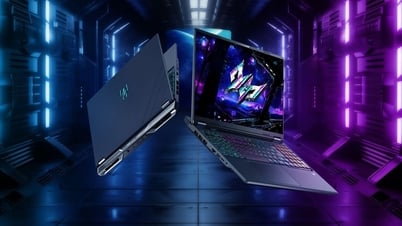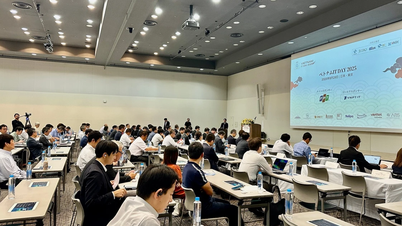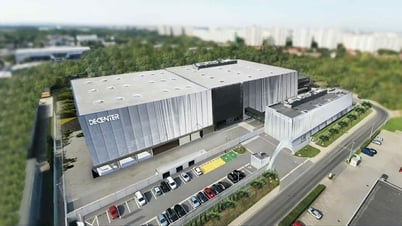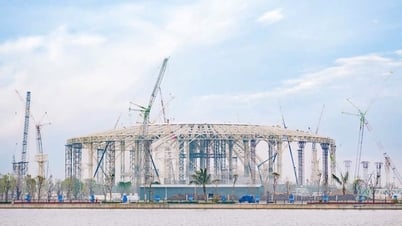On August 27, CEO of chip maker Nvidia, Jensen Huang, affirmed that the wave of spending on artificial intelligence (AI) chips is not over and predicted that the opportunity will expand into a trillion-dollar market within the next 5 years.
However, despite Mr. Huang's optimistic view, Nvidia shares fell 1.56% to $178.77 in pre-market trading on August 28.
The reason for this result is that the company's Q3/2025 revenue forecast did not create as strong an impression as investors expected.
Nvidia reported revenue of $46.7 billion in the second quarter of 2025, up 56% year-over-year and slightly above analysts' expectations of $46 billion. Net income was $26.4 billion, up 59% year-over-year.
Nvidia expects third-quarter 2025 revenue to reach $54 billion, with a margin of error of less than 2%. This figure does not include sales of the H20 chip in China.
The revenue outlook does not include potential revenue from the Chinese market, reflecting uncertainty due to US-China trade tensions.
Mr. Huang offered reassurance to investors concerned about signs of slowing growth. His optimism contrasts with recent gloom in the AI stock market and warnings from some tech industry leaders that investors are getting too excited.
“A new industrial revolution has begun. The AI race is on. We forecast spending on AI infrastructure to reach $3 trillion to $4 trillion by the end of the decade,” said Nvidia CEO.
The main driver of Nvidia chip demand comes from large technology corporations, which own and operate massive data centers to provide cloud computing, AI and global digital infrastructure services.
“The megacaps are driving much of the capital spending that Nvidia is benefiting from,” said Matt Orton, director of advisory solutions at Raymond James Investment Management.
He believes that the AI investment wave remains strong, as tech giants continue to expand their businesses without showing any signs of slowing down in Nvidia's earnings.
Nvidia’s stock has outperformed the broader market by about 10% since the start of the year, but AI stocks have shown signs of cooling. OpenAI CEO Sam Altman recently warned investors that they may be “overexcited” about AI.
Still, Mr. Huang seemed unconcerned, stressing that Nvidia’s technology helps customers process ever-increasing amounts of data with lower power consumption.
Mr. Huang based his forecast on the $600 billion that big customers like Microsoft and Amazon will spend on data centers this year.
According to him, with a data center costing up to 60 billion USD, Nvidia can earn about 35 billion USD.
Nvidia's high-end Blackwell chips are fully booked through 2026, while the previous generation of Hopper chips are still selling well./.
Source: https://www.vietnamplus.vn/ceo-nvidia-lac-quan-ve-trien-vong-nhu-cau-chip-ai-post1058593.vnp




![[Photo] Politburo works with the Standing Committee of Cao Bang Provincial Party Committee and Hue City Party Committee](https://vphoto.vietnam.vn/thumb/1200x675/vietnam/resource/IMAGE/2025/8/28/fee8a847b1ff45188749eb0299c512b2)
![[Photo] General Secretary To Lam attends the opening ceremony of the National Achievements Exhibition](https://vphoto.vietnam.vn/thumb/1200x675/vietnam/resource/IMAGE/2025/8/28/d371751d37634474bb3d91c6f701be7f)
![[Photo] Red flag with yellow star flutters in France on National Day September 2](https://vphoto.vietnam.vn/thumb/1200x675/vietnam/resource/IMAGE/2025/8/28/f6fc12215220488bb859230b86b9cc12)
![[Photo] Prime Minister Pham Minh Chinh meets with Speaker of the New Zealand Parliament Gerry Brownlee](https://vphoto.vietnam.vn/thumb/1200x675/vietnam/resource/IMAGE/2025/8/28/cec2630220ec49efbb04030e664995db)
![[Photo] General Secretary To Lam presents the 45-year Party membership badge to comrade Phan Dinh Trac](https://vphoto.vietnam.vn/thumb/1200x675/vietnam/resource/IMAGE/2025/8/28/e2f08c400e504e38ac694bc6142ac331)





























































































Comment (0)